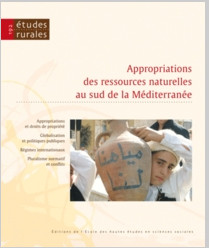La gestion de l'eau au Liban: une réforme confisquée??
 |
Water Management in Lebanon: A Confiscated Reform?
article Jun 2013 ; 19 pages
Aut. Stéphane Ghiotti & Roland Riachi
Ed. EHESS - Paris
Téléchargeable sous format: PdF
Téléchargeable chez l'éditeur
Résumé:
Au Liban, au discours colonial du début du xxe siècle qui vantait l’abondance des ressources en eau a succédé la peur, aujourd’hui largement partagée, d’une menace de stress hydrique à l’horizon 2030. Ce retournement discursif contraste avec l’inertie des textes réglementaires régissant le droit d’usage de l’eau, et ce malgré les nombreuses entreprises de modernisation successives (période ottomane, Mandat, État moderne). Dès son origine, ce droit d’usage de l’eau est fortement corrélé au régime foncier. L’appropriation de ces deux ressources est un enjeu majeur au cœur des modalités d’exercice du pouvoir économique et politique. L’article envisage, sur le temps long, le contenu de différentes réformes ayant trait au domaine de l’eau. Quatre séquences sont privilégiées : le Medjellé ; la période mandataire ; les grands travaux d’après l’Indépendance ; la réforme entamée après la guerre civile. On observe d’intenses et continues luttes de pouvoir, entre de multiples acteurs, pour le maintien des multiples systèmes d’appropriation des ressources. Abstract:
The premise of this paper is that there has been a significant shift in the prevailing discourse on water resources in Lebanon over the past century. In contrast to widespread confidence in the country’s abundant water resources at the beginning of the twentieth century, the dominant view today is that there is likely to be a serious water shortage by 2030. This discursive shift contrasts sharply with the legislative and regulatory inertia surrounding water-related laws despite repeated attempts at modernization by successive regimes and authorities (the Ottoman Empire, the French Mandate, and the modern state). Water rights in Lebanon have always been closely linked to land tenure. Today, the appropriation of land and water resources is a major focus of political and economic debate. This paper has two objectives. First, it provides a historical overview of legal and institutional reforms adopted in the water sector. A distinction is made between four main periods: the Ottoman period (Mecelle), the French Mandate period, the post-independence period (1943-1990), and the postwar period (the reconstruction period). Second, the paper shows that there have been constant and intense power struggles between multiple actors seeking to maintain multiple systems of resource appropriation. Sommaire:
L’eau et le foncier : les amis du puissant
Régimes de droit et catégories sociales
Réformes foncières et administratives sous l’empire ottoman
Le Medjellé
La période mandataire française (19201943)
Réglementation et institutions spécialisées
Les limites du modèle de modernisation
Indépendance nationale : ruptures et continuités
La difficile mise en place d’une politique nationale de l’eau
La planification : remède ou signe d’impuissance ?
L’eau et le conflit libanais
La reconstruction (1990-2010)
L’eau dans une économie rentière aux institutions fragmentées
Les barrages : une solution en trompe-l’œil
Conclusion
Contents:
Water and Landed Property: Friends of the Powerful1
Legal Systems and Social Categories
Land and Administrative Reforms under the Ottoman Empire
The Mecelle
The French Mandate (1920-1943)
Regulation and Specialized Institutions
Limitations of the Modernization Model
National Independence: Breaks and Continuities
The Difficult Establishment of a National Water Policy
Planning: Solution or Sign of Powerlessness?
Water and the Lebanese Conflict
Reconstruction (1990-2010)
Water in a Rent Economy with Fragmented Institutions
Dams: An Illusory Solution
Conclusion
Public-Cible:
Mots clefs: |
accès à l'eau (CI) (DT) (OP) , analyse socio-économique (CI) (DT) (OP) , mode de gestion/gouvernance (CI) (DT) (OP) |
Pays concerné: |
Editeur/Diffuseur: |
|
EHESS
-
École des hautes études en sciences sociales - Paris |
En cas de lien brisé, nous le mentionner à communication@pseau.org